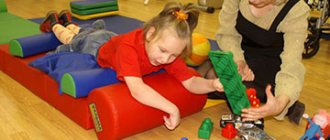It is impossible to stop dementia - the process of destruction of nerve cells that has begun will inevitably lead to complete degradation of brain activity. Currently, there are no effective treatments that can completely cure this neurodegenerative disease. At the same time, the diagnosis of “dementia” should not sound like a death sentence and condemn one to complete inaction. With proper support, people with senile dementia can not only live a quality life for 10-15 years, but also engage in any activity and take an active part in the life of their family and society.

What is dementia and how does it manifest?
Dementia is not a disease in the usual sense of the word. According to the International Classification of Diseases, this is a syndrome, that is, a complex of symptoms associated with a common cause. It is observed in certain brain diseases or develops due to other factors.
One of the first signs of dementia is memory loss. Both long-term and short-term memory weakens: the patient may forget familiar routes and names, ask for the same information over and over again, lose personal belongings, etc. At the same time, the ability to assimilate and process information is impaired.
Additionally, with dementia, at least one group of symptoms from the following list (or several at once) is noted:
- The ability to think logically and solve complex problems is impaired.
- Critical thinking deteriorates. This means that a patient with dementia cannot make decisions and manage money independently; he ceases to see dangers in the environment.
- Speech function is impaired. A person makes mistakes and forgets familiar words, stops understanding phrases in a figurative sense, and pauses when speaking. As the syndrome develops, it becomes increasingly difficult for him to express his thoughts and communicate with loved ones.
- The ability to think in abstract categories is lost.
- The ability to visually recognize objects in space deteriorates. A person has difficulty recognizing people by their faces; he may forget what his house looks like and why the surrounding objects are needed. At the same time, physical vision may remain good - it’s just a matter of cognitive function.
- Human behavior changes and personality disintegrates. The range of interests may narrow, apathy, aggression towards others, sudden mood swings and a desire to avoid social contacts may appear.
The importance of rehabilitation in the fight against dementia
Successful rehabilitation of patients with dementia depends on many factors influencing the course of chronic pathology of the central nervous system. How effective the efforts made to preserve memory and thinking as much as possible will be determined by the following conditions:
- timely diagnosis;
- person's age;
- organization of quality care;
- the presence of concomitant somatic pathologies.
Rehabilitation for people who are gradually losing previously acquired knowledge and practical skills primarily includes anti-dementia exercises that stimulate the cognitive functions of the brain. Regular training improves tissue metabolism, enhances the formation of interneuron synaptic connections, and supports cell vital activity. In the early stages of the disease, exercises to activate thought processes ease and slow the progression of dementia symptoms.
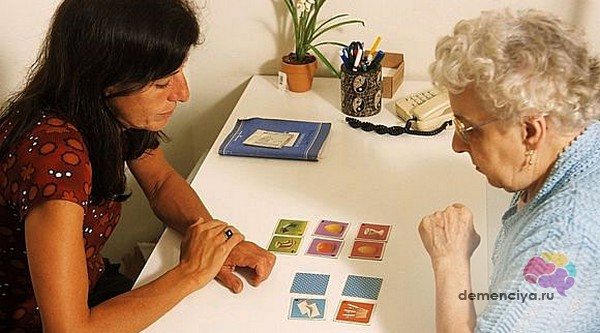
As the disease progresses, the patient's mental abilities will steadily decline, depriving him of the ability to perceive verbal information. Changes will also affect a person’s character, personality traits, and behavior. This specificity of the disease involves directing the main efforts in rehabilitation to memory training through the senses: vision, hearing, smell, taste. Even in the later, severe stages of dementia, tactile touch evokes glimpses of the surrounding reality on an emotional level.
Important! Correctly selected exercises for dementia for older people will help them maintain their sense of self-worth, self-respect and independence for as long as possible, and realize their importance and significance.
According to many experts, activities for dementia, which make up the psychological side of complex rehabilitation, in most cases are one of the key points in the cognitive rehabilitation of intellectual disabilities. Help of this type improves the course of the disease, and care and attention from loved ones strengthens communicative relationships within the family.

Types of dementia and causes of its development
Depending on the causes of dementia, there are several types of this syndrome:
- Dementia due to diseases of the nervous system (also called atrophic). It develops due to damage to brain cells in Parkinson's disease, Alzheimer's disease, Pick's disease and other pathologies. This type also includes dementia with Lewy bodies - pathological formations of a protein nature inside nerve cells.
- Vascular dementia. Its cause can be pathologies of cerebral vessels - from arterial hypertension to stroke.
- Mixed. This type includes dementia that occurs due to a combination of several diseases or risk factors.
Also, the causes of dementia include poisoning with potent drugs and metal salts, metabolic disorders (including diabetes), infectious brain lesions, injuries and tumors, and severe alcohol addiction. These reasons are listed in the medical manual “Dementia” (edited by Academician N.N. Yakhin).
All pathologies and factors have one thing in common: they destroy brain cells. Moreover, the lesion can be focal, because the diseases affect different lobes of the main organ of the nervous system - frontal, temporal, parietal, etc. Depending on the cause and nature of the lesion, the complex of symptoms may also differ when comparing the clinical picture of several patients.
Stages of dementia
An important characteristic of dementia: this syndrome does not just involve intellectual impairment. Dementia is diagnosed only in cases where, due to serious impairments, the patient loses the ability to lead a social life, work and take care of himself in everyday life. Until this point, they speak of a gradual decline in mental function, which can last for several years.
It turns out that dementia itself is the most severe degree of cognitive impairment, when it becomes most severe. However, the syndrome also develops in certain stages.
Depending on the severity of the manifestations, there are three stages of dementia:
- Easy. The patient cannot fully work and communicate with other people due to intellectual impairment, his interest in ordinary hobbies and activities weakens. But at the same time, he remains independent in everyday life and navigates his home.
- Moderate. A person loses the ability to use the simplest household items and appliances without the help of loved ones, and constantly needs accompaniment. However, he can still dress himself, lift a spoon to his mouth, or perform other simple tasks.
- Expressed. Such a patient requires almost round-the-clock care, as he is completely maladjusted. At this stage they talk about the so-called “senile dementia”.
In addition, a distinction is made between focal and global dementia. Focal impairments affect a person's memory and intelligence, but his personality and critical thinking are preserved. Global dementia is characterized by a gradual disintegration of personality, serious changes in behavior, and loss of the ability to think critically.
Service projects
Service projects stimulate self-esteem, awareness among group members and a sense of belonging.
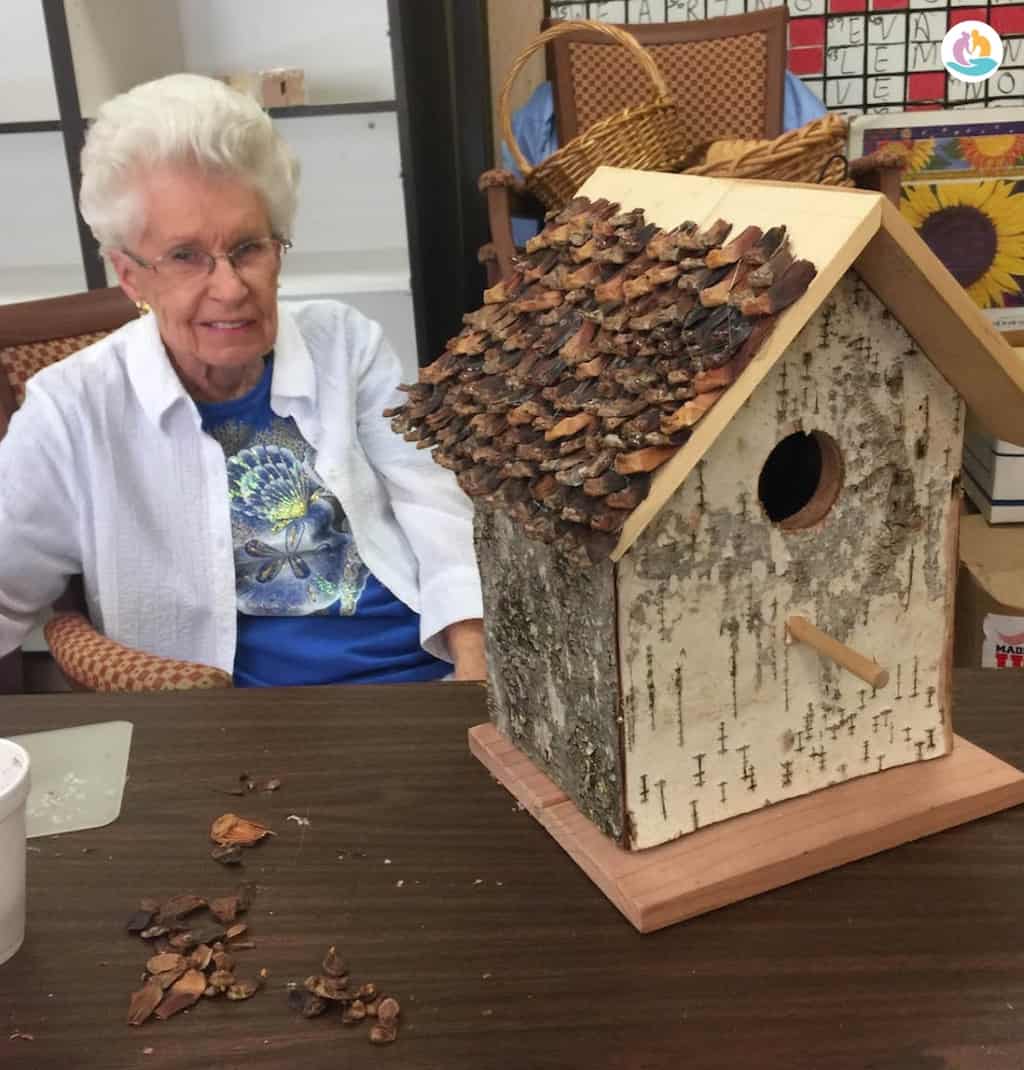
- Making decorative and household items to improve and maintain the residence: making puzzles, wall decorations, chessboards, photo albums and photo frames, napkin holders and kitchen table mats, pillows; garden and flower bed care; production of invitations to holidays, wall calendars, gift envelopes; window cleaning; cleaning tables; dusting; cleaning leaves.
- It is possible to interact with religious and social organizations (for example, orphanages) regarding joint service projects. For example, making soft toys for an orphanage.
- Make wooden birdhouses and donate them to parks.
- Making toys for homeless animal shelters.
- Make giant dominoes, puzzles, chess pieces and blocks for preschool.
- Invent and make “Thank you” notes, valentines.
- Check out surrounding organizations and think about how you can collaborate with them on service projects.
Dementia is a disease of the elderly: how cognitive impairment is associated with age
Dementia is a syndrome that overwhelmingly affects older people. Vascular pathologies, metabolic problems, and diseases of the nervous system often appear in adulthood due to natural causes, and they are the ones that lead to disturbances in mental function.
Moreover, the risk of developing dementia in the elderly increases with age. According to research, among people over 55 years of age, the percentage of cases is up to 8%, while after 80 years of age, the likelihood of experiencing cognitive impairment increases many times (up to 40–45%).
Russian scientists E.E. Vasenina, O.S. Levin and S.G. Sonin calculated that in Russia in 2020 there were 1.7 million people with dementia, and worldwide their number was close to 50 million (based on a scientific article by the named team of authors).
Along with the increase in life expectancy, the number of patients with cognitive impairment will also increase - this is the forecast of scientists. Therefore, early detection of the disease, prevention and supportive care are extremely important.
Diagnosis of dementia
Diagnosing dementia can be difficult due to the fact that the range of symptoms and causes that led to cognitive impairment can vary significantly between patients. As a rule, the diagnosis of dementia takes place in several stages and begins with an initial consultation.
To clarify the clinical picture, it is important for the doctor to:
- talk with the patient or person caring for him, collect anamnesis. The doctor uses a questionnaire specially developed for this purpose and finds out when the first signs of dementia appeared and what exactly the cognitive difficulties are. Next, the specialist asks questions about the patient’s lifestyle and health and finds out which risk factors are present;
- assess physical condition - gait, coordination of movements, fluency of speech;
- conduct a short cognitive test using one of the methods accepted in the medical community;
- determine whether dementia is caused by reversible or irreversible causes. This may require laboratory tests.
If the initial conversation and examination is conducted by a therapist, he has reason to suspect the development of dementia, the doctor will refer the patient to a specialized specialist for detailed diagnosis and further treatment.
People often hesitate to see a doctor because they are afraid to hear the diagnosis of dementia and attribute the first signs of the disease to normal age-related changes. But this is a fundamentally wrong tactic, because the earlier the syndrome is identified, the greater the chances of prolonging the usual full life and delaying severe manifestations of the disease.
Exercises for people with dementia
The main rule in rehabilitation is that all activities used for people with dementia should resonate positively with them, bring satisfaction and increase self-esteem.
Experts advise trying different exercises and focusing on those that evoke pleasant emotions and memories in patients. In addition, it is important to alternate different types of training - auditory, visual, verbal, and mental agility. This approach to the rehabilitation of impaired mental functions will help to avoid fatigue, irritability, reluctance and refusal to further activities. Recommended exercises for dementia
| Exercises for logical thinking, visual and analytical memory | Exercises for the rehabilitation of auditory, abstract and tactile memory | Exercises with additional stimulation of fine motor skills of the hands |
|
|
|
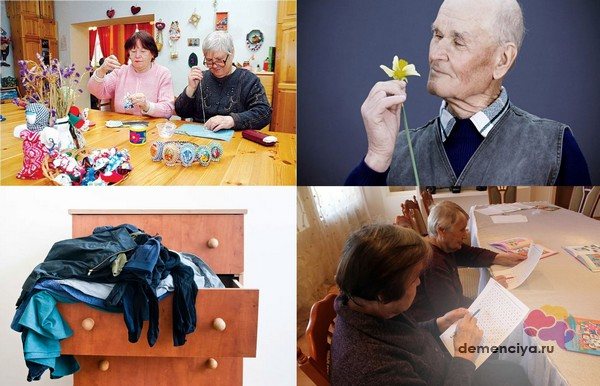
A rehabilitation center for dementia patients provides the opportunity for informal communication that people with mental disorders often lack. In addition to cognitive training conducted by professional teachers and psychologists, volunteers, artists, and musicians are involved in working with students. At the meetings, patients and family members learn how to live with dignity with a serious illness, understand and accept loved ones who are losing their personality traits.
Rehabilitation for dementia as an important part of treatment provides a chance to delay the negative consequences of the disease. According to statistics, correction of declining cognitive functions using cognitive exercises and adequate drug therapy reduces the time spent caring for the patient by 30%. This means that showing care for a loved one will help them feel useful and needed, and help relatives maintain strength and health to fulfill their caregiving obligations.

Is dementia incurable?
Indeed, modern medicine is not yet able to completely reverse the process and cure the onset of dementia. But it is wrong to treat dementia as an irreparable condition in which any treatment is pointless.
It is impossible to do without maintenance therapy, because it can greatly alleviate symptoms, slow down the progression of the disease and improve the quality of life of patients with dementia. In addition, dementia can have a different nature; it is not always caused by incurable neurodegenerative diseases. In some cases, the syndrome is caused by metabolic disorders or infections that can be treated.
Discussion groups and word games
Discussions and word games stimulate memory, speaking skills, emotions, engagement and socialization and a sense of security.
Notes: Discussion circles and word games can be held back to back on the same topic. For word games you need to use a board (chalk or marker).
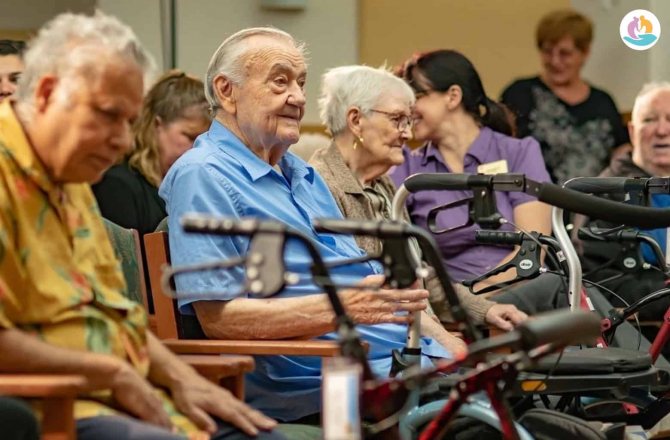
Classic word games: the new word must begin with the letter that the old word ends with. All words must relate to the chosen topic. For example, autumn is discussed. Then participants can use all the words with which they think autumn is associated.
See also:
- Caring for bedridden patients at home
- Rehabilitation after hip replacement
- DIY changes in the home of a person with dementia: advice for relatives
Other word games:
- Not really. The presenter thinks of a word, and the participants ask leading questions, to which the presenter can only answer “yes” or “no.”
- Regular riddles
- Simple crosswords and scanwords, collective solving
- Collect words from a table with a random set of letters. The winner is the one who collects the longest word.
- Competition for spelling words (difficult words are selected and participants must take turns pronouncing the correct spelling of the word)
- Definition competition. Complex words are selected from a dictionary or encyclopedia and the one who can define this word receives a point. You can divide participants into groups.
Discussions:
- Reading and discussing humorous essays
- Reading short stories and poems
- Writing letters and poems
- Watch and discuss the film or slides (choose carefully!)
- View and listen to any special guest
Drug treatment of dementia and its features
In some cases, the doctor may prescribe specialized medications to slow the progression of the disease and improve the patient's condition. This may be required, for example, in case of infectious brain lesions, pain syndrome, insomnia and in other situations.
Depending on the type of dementia and its clinical manifestations, the doctor may prescribe anti-dementia, vascular-metabolic drugs, as well as antidepressants, sleeping pills or neuroprotectors. If dementia is accompanied by vascular pathologies or metabolic disorders, medications indicated for these conditions may be prescribed.
However, do not forget that uncontrolled use of medications is dangerous. After all, drugs that stimulate improvements in one type of dementia are often contraindicated in cognitive impairment of another nature.
What else is important to know about drug treatment for dementia:
- It is important to take medications prescribed by a specialist regularly, otherwise their effectiveness will be low. It is important for people caring for patients with dementia to understand that an elderly person with cognitive impairment cannot control their medication intake on their own and needs ongoing assistance. In this case, medications should be stored out of reach and given in strict dosages.
- Most medications do not give immediate results. The first improvements can usually be expected within a few weeks after starting therapy.
- Medicines are prescribed for a short period of time (usually up to 3 months), and then it is important to talk with the doctor again and adjust the therapy so that it really effectively resists the development of dementia.
- Be aware of side effects and possible incompatibility of different drugs with each other. So that the doctor can correctly select medications and, if necessary, find replacements for them, it is important to inform the specialist about all medications that a person with dementia is taking.
Non-drug treatment methods
Non-drug methods of maintenance therapy for patients with dementia can also effectively influence the cognitive sphere. They are used simultaneously with taking medications prescribed by the attending physician.
The advantage of these methods is that they have no contraindications and are used for any type of dementia, except for the most severe stage.
What methods of restoring cognitive function are indicated for dementia:
- Cognitive training. During the training, simple fragments of poems are memorized, passages of text are read aloud, and other exercises are performed.
- Cognitive stimulation. It involves influencing different senses, and is often carried out in a group. The activity may include warm-up, simple games, singing, dramatization, riddle solving and other activities.
- Biographical training. Since long-term memory is often affected in dementia, it is helpful to repeat and reconstruct past events.
- Music therapy, art therapy. The interest of patients with dementia in the outside world fades over time, so it is important, at least during special classes, to maintain contact with the field of art, to continue education and development in a simplified form.
- Diary entries. The practice of keeping a diary is not only useful for maintaining speech function, but also allows patients to record their own emotions and experiences.
- Walking and light exercise - physical activity in any form is highly desirable.
It is important to conduct classes daily, devoting enough time to them to get a positive effect.
What to do with patients who do not want to participate?
New patient
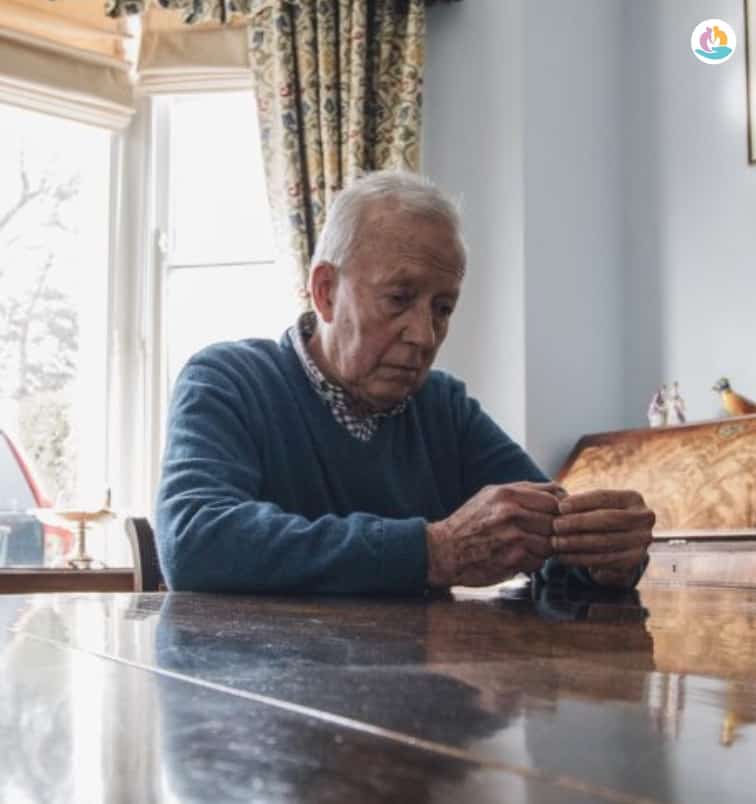
New residents require a lot of time and care.
- Review the patient's history carefully. Show the patient your interest. Because the patient has problems with short-term memory, you and other employees of the boarding house may seem like strangers to him, even if you have already met before and, as it seems to you, know you well. All you need to do is convince the person that you know him/her a little, that you are friends and that you can be trusted. It is difficult to fake body language and facial expressions if deep down you are unfriendly. Therefore, be sincerely friendly and interested in communicating with the person. Even if the person can no longer speak. Spend extra time with him/her or assign someone on staff to do this.
- During each visit, remind them that you are friends. If necessary (or seeing embarrassment in your eyes), remind them who you are and what your name is, remind them of your previous visits. Use tactile and visual gestures. Be kind. Don't reproach a person for not remembering you.
- When visiting a patient, let him know that you already know about him. This will let the person know that you care and care about him.
- All employees of the establishment must use a positive and consistent approach.
- Create new positive experiences. Next, remind about it. Points of contact are needed.
"Reluctant" patient
A patient who does not want to participate in activities requires the same attention as a new patient. Your goal with this patient is small, incremental improvements. Document all your efforts to achieve patient engagement and note any small successes along the way.
In order to involve a person in classes:
- You must know him. Start by suggesting activities that he might be interested in.
- Overcome communication barriers. When you invite a person to join a class, say “Come on, I’ll show you something interesting” or “Join me company.” Don't go into a lengthy description of the event. Use tactile and visual gestures.
- During the lesson, make sure that the person understands what is happening. Use gestures, signs, show more examples.
- A person may be afraid to leave a familiar place. Convince him that you will take him to a pleasant place where he has been before, and that you will stay with him, not leave him there alone. And that you will then take him back to his room.
- Ask to keep the person company. This should not sound like an order or demand.
PS We also had an interesting article about competitions and entertainment for older people, which complements the article you just read.
Let me know if the ideas above were helpful. Tell us about your experience!
Prevention of dementia: how to prevent the development of the syndrome
Unfortunately, it is impossible to completely protect yourself from cognitive impairment: they are often provoked by unpredictable and not fully explained by science pathologies (which include, for example, Alzheimer's disease).
However, several areas of dementia prevention are recognized worldwide. They are effective because approximately 35% of dementia is due to modifiable risk factors. By eliminating these factors in advance, you can reduce the risk of cognitive impairment in old age.
What preventive measures are the most effective and important:
- Physical activity. It is physical education that today is considered the basis of prevention, since it has a complex effect on the body and prevents direct and indirect risk factors. It is important to systematically engage in physical activity throughout your life or start as early as possible before cognitive function begins to decline. Intense training brings particular benefits to the brain, but if there are contraindications for it, do it to the best of your ability, appropriate for your age. Physical exercise not only affects the psychological state of a healthy person in the present, but also protects nerve cells and can prevent intellectual decline in the future.
- Maintaining body weight within normal limits. Obesity, and as a result vascular diseases and diabetes, are serious risk factors that are best avoided.
- Treatment of arterial hypertension. If this disease is detected at an early age, it is important not to let it take its course and be registered with a cardiologist. The goal of this area of prevention is to restore the health of the cardiovascular system before disruptions in its functioning provoke irreversible damage to brain cells.
- Mental activity and multi-stage education. To ensure that cognitive functions do not suffer in old age, it is important to give the brain sufficient and constant load. It has been proven that people who only completed primary school and stopped studying at age 11–12 have a one and a half times higher risk of cognitive impairment. At the same time, complete secondary or higher education significantly reduces the likelihood of developing dementia.
- Quitting smoking and drinking alcohol. Destruction of brain cells under the influence of ethyl alcohol or nicotine is one of the indirect causes of dementia, which should be excluded in advance.
- Active social life. Lack of social interaction and voluntary isolation at an early age may also be risk factors. Therefore, it is important to maintain a sufficient number of contacts with colleagues, friends and loved ones.
- A healthy diet, which must include fruits, vegetables and fish, and it is better to reduce the percentage of meat and dairy products. This is the so-called Mediterranean-type diet, which has a beneficial effect on the condition of blood vessels and the body as a whole.
Diagnosis and treatment of dementia in Moscow
Senile dementia has a reputation for being incurable, but it is important to remember that some forms are preventable. In addition, even if the affected brain cells cannot be restored, proper treatment can slow down degenerative processes and significantly improve the quality of life of a person experiencing the syndrome. For any type of dementia, the patient must receive the necessary drug and non-drug therapy, as well as full care, help with everyday life and moral support.
You can contact the specialists of the Medical Center on Botanichnaya for detailed advice on the prevention or treatment of dementia. Remember that it’s not the diagnosis that’s scary—it’s the ignorance and lack of qualified help at a time when a lot depends on it.


